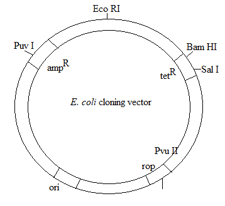Tools of Recombinant DNA Technology
Tools of Recombinant DNA Technology: Overview
This topic consists of various concepts like Enzymes Used in Recombinant DNA Technology,DNA Ligases,Cleaving Enzymes, etc.
Important Questions on Tools of Recombinant DNA Technology
A recombinant DNA is formed when sticky ends of vector DNA and foreign DNA join. The sticky ends are formed by which of the following enzymes:
Agrobacterium mediated genetic transformation described as natured genetic engineering is used to resist plants from:
Which of the following technique is used for separating the fragments of DNA cut by restriction endonucleases?
Biotechnologists refer to which of the following bacteria as a natural genetic engineer of plants.
Which of the following feature of a vector is required to identify the transformed cell?
In recombinant DNA technology, ‘molecular scissors’ are:
Which of the following compound is used in visualisation of DNA fragments in gel electrophoresis?
An extra-chromosomal, self-replicating part of the cell that has proven to be a boon to biotechnology is:
Read the following statements and choose the correct option:
i. Agrobacterium tumefaciens, a pathogen of several monocot plants, is able to deliver a piece of DNA known as "T-DNA".
ii. The tumor inducing (Ti) plasmid of Agrobacterium tumefaciens has been modified into a cloning vector, which is no more pathogenic to the plants.
The genes (a) ori, (b) ampR and (c) rop are associated with which of the following vectors:
Which of the following microorganism is best suited as a cloning vector to introduce nematode specific genes in plants?
Fragments of DNA segments can be separated by:
Restriction endonucleases are used as:
In genetic engineering, which of the following is used?
A gene is inserted into the Puv II site of the cloning vector (given below) and transformed into E. coli. Which one of the following statements is then true?

If recognition sequence of an enzyme has 4 bp, how many recognition sequences could you find in a DNA with 20 kb?
Main steps in the formation of Recombinant DNA are given below. Arrange these steps in a correct sequence.
A. Insertion of recombinant DNA into the host cell.
B. Cutting of DNA at specific location by restriction enzyme.
C. Isolation of desired DNA fragment.
D. Amplification of gene of interest using PCR.
Choose the correct answer from the options given below:
During the purification process for recombinant DNA technology, addition of chilled ethanol precipitates out
Upon exposure to UV radation, DNA stained with ethidium bromide will show:
The Ti-plasmid being used as cloning vector-
